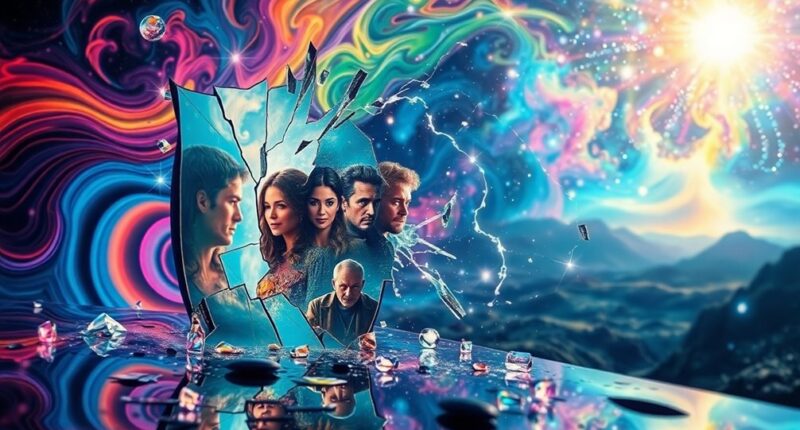If you loved “Everything Everywhere All At Once,” you’re in for a treat! Films like “Sorry to Bother You,” “Colossal,” and “The Lobster” mix absurdity with sharp social commentary. “Being John Malkovich” and “Scott Pilgrim Vs. The World” take identity and reality on wild rides, while “Spider-Man: Into the Spider-Verse” dazzles with innovative animation. Don’t miss “After Yang” and “Antibirth” for unique narratives and thought-provoking themes. Stick around to uncover even more mind-bending recommendations!
Key Takeaways
- “Being John Malkovich” offers a surreal exploration of identity and obsession, making it a thought-provoking watch for fans of unconventional narratives.
- “Colossal” combines dark comedy with science fiction, using a monster metaphor to tackle personal struggles and responsibility.
- “Scott Pilgrim Vs. The World” features inventive storytelling and dynamic visuals, merging video game aesthetics with real-life challenges.
- “Spider-Man: Into the Spider-Verse” innovatively uses animation to tell a multiverse story centered on a biracial protagonist, appealing to imaginative viewers.
- “Antibirth” blends body horror with dark comedy, challenging perceptions of bodily autonomy and societal norms, while creating a unique narrative experience.
Sorry to Bother You (2017)
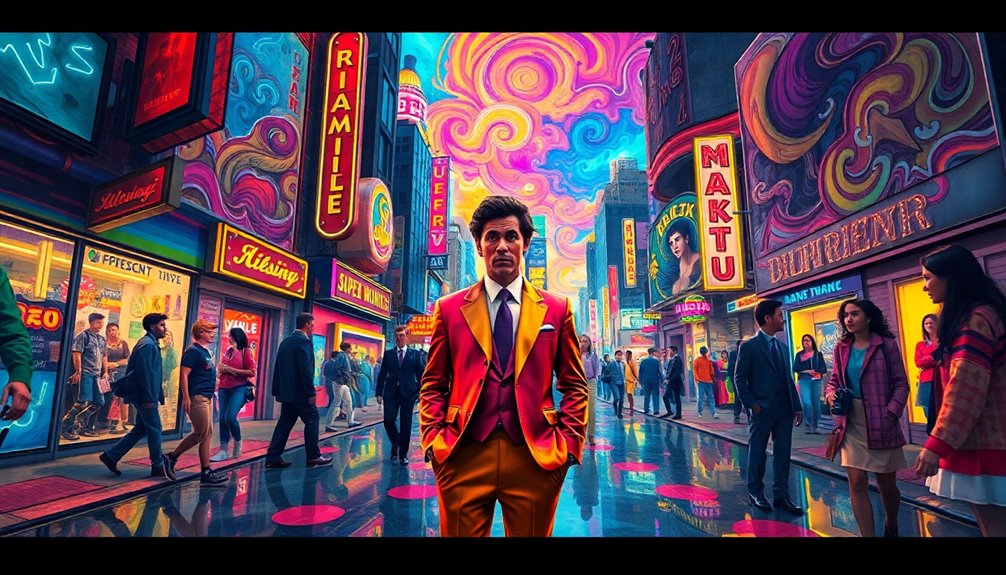
If you’re looking for a film that combines humor with sharp social critique, “Sorry to Bother You” (2017) is a must-see. This black comedy follows Cassius Green, a struggling telemarketer who discovers the secret weapon of using a “white voice” to climb the corporate ladder.
Through its surreal narrative, the film critiques capitalism and explores themes of race and identity. As Cassius gets tangled in a bizarre corporate conspiracy involving the eerie WorryFree, the absurd humor amplifies its social commentary.
Tessa Thompson shines as Detroit, Cassius’s girlfriend, maneuvering her own identity struggles. With a 92% approval rating on Rotten Tomatoes, “Sorry to Bother You” stands out for its originality and thought-provoking themes, making it a cinematic experience you won’t forget. The film’s exploration of corporate ethics resonates with contemporary discussions about the role of morality in business practices.
Being John Malkovich (1999)
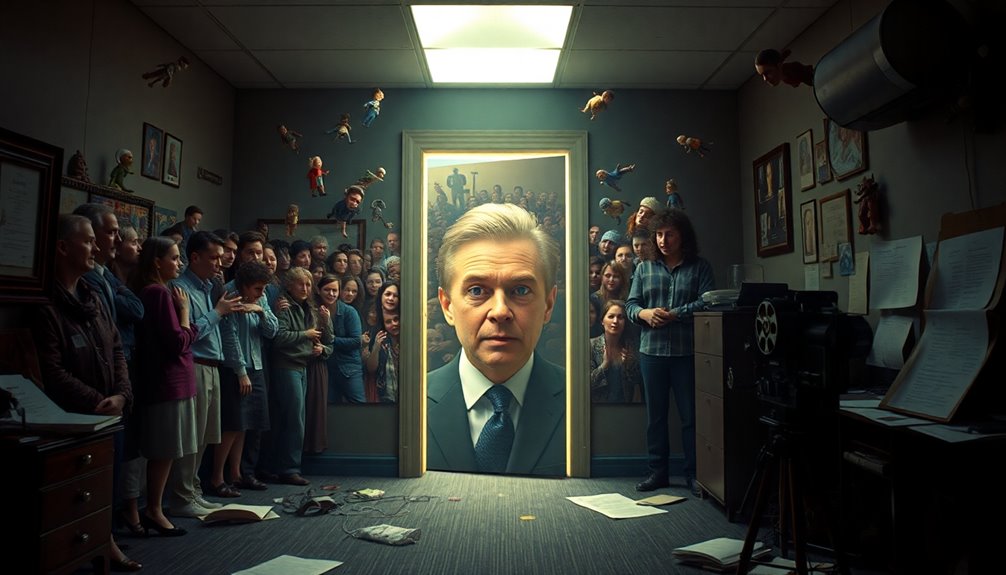
“Being John Malkovich” (1999) is a mind-bending journey that invites you into the bizarre world of identity and obsession. Directed by Spike Jonze, this surreal comedy follows puppeteer Craig Schwartz, played by John Cusack, who discovers a portal into the consciousness of actor John Malkovich.
As characters grapple with their desire to inhabit Malkovich’s identity, dark humor and chaos ensue, revealing the absurdities of celebrity culture. The film’s unique premise and thought-provoking commentary have cemented it as a cult classic.
Garnering three Academy Award nominations, including Best Original Screenplay for Charlie Kaufman, “Being John Malkovich” skillfully blends fantasy with introspection, making it an unforgettable exploration of obsession and self-perception. The film’s exploration of identity and obsession resonates with themes found in various forms of art, much like the therapeutic benefits of essential oils in promoting emotional well-being.
Colossal (2016)

In “Colossal” (2016), the absurdity of human struggle takes center stage as Gloria, played by Anne Hathaway, grapples with her own demons while inadvertently controlling a monster wreaking havoc in Seoul.
This dark comedy blends science fiction with a unique narrative that reflects Gloria’s personal struggles, particularly her battle with addiction. As she navigates her chaotic life, the film offers a surreal exploration of responsibility and self-discovery.
Hathaway’s performance shines, showcasing her range in both comedic and dramatic moments. Critics praise “Colossal” for its innovative premise, where the monster serves as a metaphor for internal turmoil and the consequences of one’s actions.
This mind-bending flick invites you to reflect on the complexities of human relationships amidst fantastical chaos, much like how Waldorf toys encourage emotional and social growth through imaginative play.
Scott Pilgrim Vs. The World (2010)
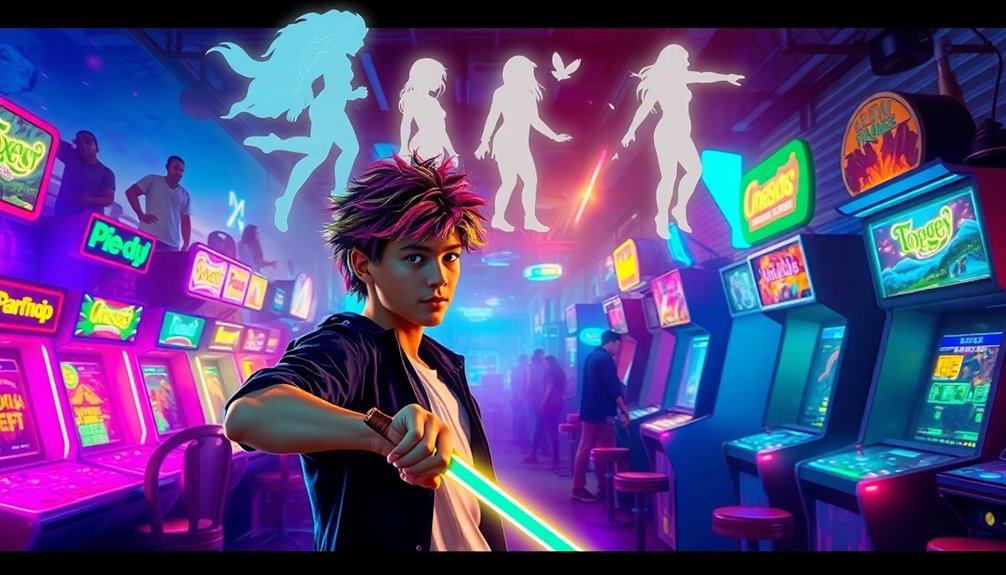
Scott Pilgrim Vs. The World is a 2010 action-comedy directed by Edgar Wright that brilliantly combines video game aesthetics with real-life challenges.
You’ll find yourself immersed in Scott’s quirky journey as he battles his girlfriend Ramona Flowers’ seven evil exes, all while showcasing a unique visual style that captivates.
- Stunning comic book graphics
- Quick cuts and dynamic action sequences
- Hilarious performances from a star-studded cast
- Innovative storytelling that keeps you guessing
With its sharp humor and creative narrative, Scott Pilgrim Vs. The World has earned a cult following and critical acclaim, including two Academy Award nominations. The film’s vibrant visuals are enhanced by high refresh rates, which make the action sequences pop on screen.
This film is a must-see for anyone who appreciates inventive filmmaking and engaging characters.
After Yang (2021)

While maneuvering through the complexities of family life, “After Yang” (2021) invites you into a world where technology intersects with human emotions.
Directed by Kogonada, this science fiction gem features Colin Farrell as a father endeavoring to repair Yang, a malfunctioning robot viewed as part of the family.
The film poignantly explores themes of memory and connection, emphasizing the emotional bonds forged between humans and artificial intelligence.
With its atmospheric cinematography and haunting score, “After Yang” has garnered critical acclaim for its thought-provoking narrative and striking visual storytelling.
In just 96 minutes, it offers a meditative reflection on love and loss in a futuristic setting, making it a must-see for anyone intrigued by the impact of technology on relationships. Additionally, the film resonates with the idea of subconscious power during sleep, suggesting how our emotional states can shape our connections and experiences.
The Lobster (2015)
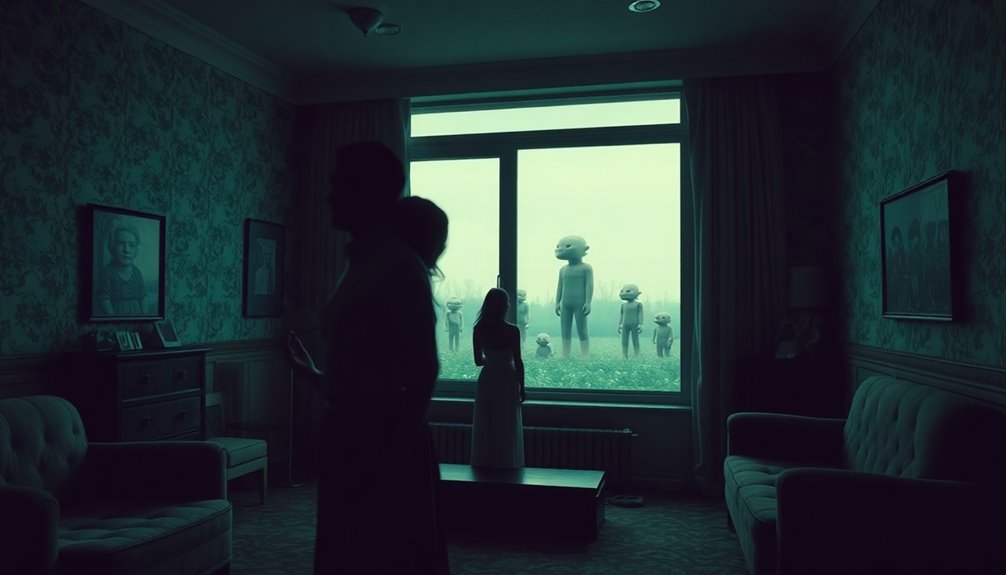
Set in a bizarre dystopia where societal norms dictate matters of the heart, “The Lobster” (2015) challenges your perceptions of love and relationships.
In this absurd world, single individuals must find a romantic partner within 45 days or face transformation into animals of their choice. Colin Farrell stars as David, maneuvering through the dark comedy that critiques societal pressures surrounding companionship.
- A unique blend of humor and Kafkaesque themes
- Exploration of isolation and the human condition
- Critical acclaim, including the Jury Prize at Cannes
- A visual style that enhances the film’s unsettling context
“The Lobster” invites you to reflect on the absurdity of love while confronting the harsh realities of conformity and transformation. This film can also resonate with those understanding children’s welfare during divorce as it highlights the emotional consequences of societal expectations on relationships.
Spider-Man: Into the Spider-Verse (2018)
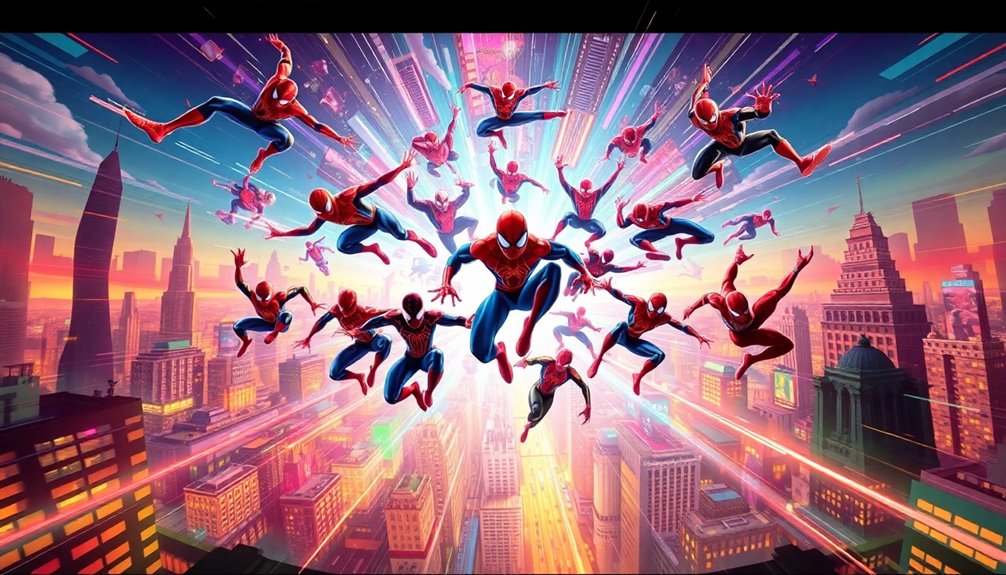
If you’re looking for a fresh take on the superhero genre, “Spider-Man: Into the Spider-Verse” (2018) delivers an exhilarating experience that intertwines innovative animation with a compelling story.
This animated film explores the multiverse through Miles Morales, a biracial protagonist who discovers his identity as Spider-Man. As he gains new powers, he meets various Spider-People, including Spider-Gwen and Peter B. Parker, showcasing themes of heroism and mentorship.
The film’s unique comic book aesthetic earned it the Academy Award for Best Animated Feature, and its diverse representation resonates with both Marvel fans and newcomers.
With groundbreaking storytelling and emotional depth, “Into the Spider-Verse” sets a new standard in animation and superhero narratives. Additionally, the film’s vibrant visual style can be compared to the soak method of watering plants, where saturation leads to thriving growth.
Antibirth (2016)
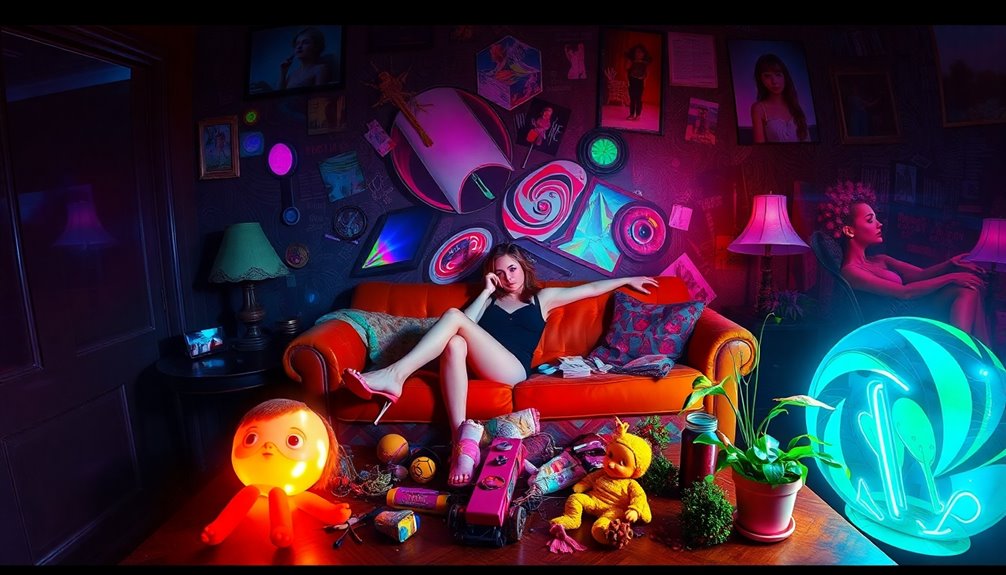
In Antibirth, you’ll encounter unsettling body horror that challenges your perception of reality.
Natasha Lyonne’s character grapples with bizarre symptoms that blur the lines between the surreal and the grotesque.
This film not only explores the horror of bodily autonomy but also critiques societal norms around pregnancy, making it a thought-provoking watch. Additionally, the film’s themes resonate with the emphasis on regional flavors and traditions showcased in unique culinary experiences, highlighting the complexities of identity and personal choice.
Body Horror Elements
While exploring the unsettling world of Antibirth, you’ll find that its body horror elements cleverly intertwine with dark comedy, creating a unique narrative experience.
Natasha Lyonne’s character grapples with bizarre pregnancy symptoms after a wild night, leading to surreal hallucinations and unsettling imagery. This film doesn’t just shock; it critiques societal norms surrounding bodily autonomy and femininity.
- Disturbing yet darkly comedic moments
- Cringeworthy scenes that enhance paranoia
- A critique of pregnancy’s societal expectations
- Striking visuals that resonate with alternative horror fans
Antibirth showcases the complexities of reality through its body horror lens, making it a standout entry in the genre for those craving something different. Moreover, it reflects the importance of nurturing an imaginative mindset when confronting unsettling themes in modern storytelling.
Themes of Reality
As you plunge into Antibirth, the film challenges your perception of reality through its protagonist’s disorienting journey.
Natasha Lyonne navigates a mind-bending narrative filled with body horror elements, where bizarre pregnancy symptoms blur the lines between hallucination and reality.
This exploration digs deep into themes of identity and bodily autonomy, forcing you to confront the implications of her unsettling experiences.
The film’s unique blend of dark comedy and horror creates an atmosphere that’s both surreal and thought-provoking, making you reflect on the complexities of the human experience.
With its unconventional storytelling, Antibirth resonates with the same themes found in *Everything Everywhere All At Once*, inviting you to question what’s real and what’s merely a construct of perception.
Frequently Asked Questions
What Are the Common Themes in These Films?
When you explore films with mind-bending narratives, you’ll often notice common themes like identity, the nature of reality, and the interconnectedness of choices.
These stories frequently investigate existential questions, showcasing characters grappling with their purpose and the consequences of their actions.
You’ll also find elements of family dynamics and the struggle between acceptance and resistance, making you reflect on your own life and the choices you face daily.
How Do These Movies Challenge Traditional Storytelling?
Imagine a film where time loops back on itself, forcing characters to confront their past choices repeatedly.
These movies challenge traditional storytelling by breaking linear narratives and blending genres. You see characters not just evolve but also experience multiple realities, creating emotional depth and complexity.
They often defy expectations, leaving you questioning the very nature of existence and choice. This fresh approach invites you to engage with the story on a deeper, more personal level.
Are There Any Similar Films to Watch After This List?
If you loved the unique storytelling style, you’ll definitely want to explore films like “Swiss Army Man” or “The Fountain.”
Both movies push boundaries and blend genres, offering thought-provoking experiences.
You might also enjoy “Annihilation” for its surreal visuals and complex themes.
“Being John Malkovich” adds a quirky twist, while “Synecdoche, New York” dives deep into the human condition.
Each of these films will challenge your perception in enchanting ways.
What Genre Blends Can Be Found in These Movies?
These films are like a vibrant tapestry, weaving together various genres to create something unique.
You’ll find elements of sci-fi, fantasy, and adventure entwined with drama and comedy. This blend invites you to explore different emotions, keeping you engaged and surprised.
As you plunge into these stories, you’ll notice how they mix genres, pushing boundaries and offering fresh perspectives that challenge conventional storytelling.
It’s a wild ride that keeps you on your toes!
How Do These Films Explore Identity and Existence?
In these films, you’ll find a deep exploration of identity and existence that resonates with you.
Characters often grapple with their true selves, facing multiple realities that challenge their understanding of who they are.
As you watch, you’ll see them navigate choices and consequences, leading to profound revelations about life’s meaning.
This journey encourages you to reflect on your own identity, pushing you to question what defines you in a vast, interconnected universe.
Conclusion
In exploring these mind-bending films, you realize there’s a common thread: they challenge perceptions of reality and identity. Just like “Everything Everywhere All at Once,” each movie pushes boundaries, inviting you to question what’s possible. They weave together humor, existentialism, and surrealism, creating a tapestry of thought-provoking narratives. So, immerse yourself in these cinematic experiences and let them reshape your understanding of the universe—because sometimes, the most profound truths lie in the most unexpected places.
